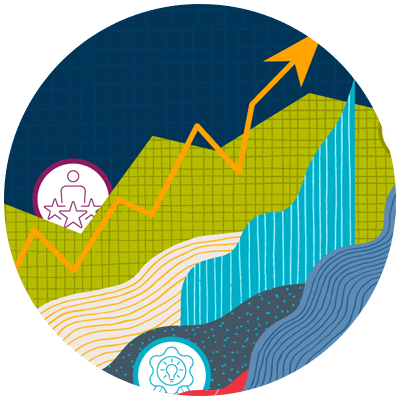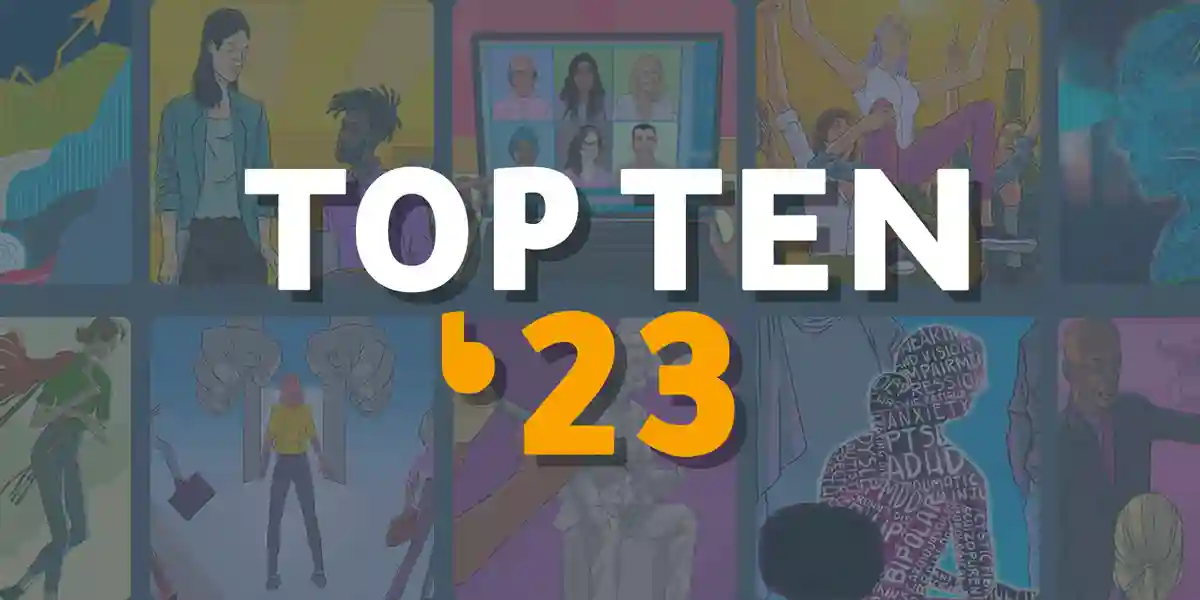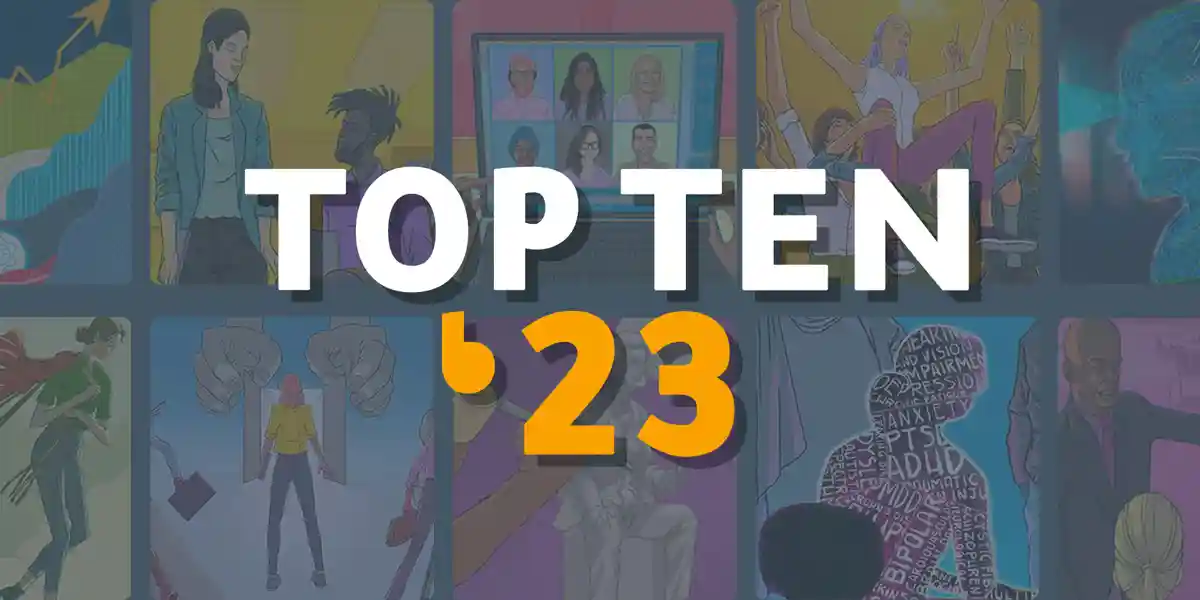As the year draws to a close, it's time to take a look at our top leadership articles of 2023. Think of it as "leadership wrapped"; DDI's greatest hits of the last year. In the last 365 days, we saw renewed interest in strong diversity, equity, and inclusion programs for better workplace culture. We also saw organizations grapple with the challenges of retaining top talent. So, without further ado, let’s dive in.

1. Learn the 10 Hot Leadership Topics for 2023
For the past eight years, we’ve identified trending leadership topics by examining content shared on social media. Based on last year’s analysis, the very hottest leadership topics for 2023 focused on employees’ needs and expectations for balance and wellbeing in the workplace. Check out the leadership trends that are coming in 2024!

2. How to Create an Inclusive Environment: 7 Skills Leaders Need
Diversity was a major topic this year as companies lost the buy-in they gained in 2020. Merely hiring diverse talent is not enough; there must be a cultural change for DEI to thrive at any organization. Effective leadership is inherently inclusive, but there are still skills leaders need to engage their team members successfully.

3. 8 Strategies for Embracing Diversity in the Workplace
Only 25% of leaders feel that inclusion is a strong part of their organization’s vision and values. The push for diversity in the workplace does not automatically prepare leaders to embrace it. There needs to be a continuous dialogue on recognizing biases and habits. Ask yourself, are you celebrating effort and acknowledging progress?

4. How to Implement a Leadership Development Program: 10 Best Practices for Success
Starting anything new can be a challenge. These best practices help you get on the right path to creating leadership skills that will help accelerate your business. A strong development program not only connects leaders and stakeholders but is built to last and succeed.

5. Can You Trust AI-Based Leadership Assessments?
With new technology came the rise in AI in leadership development. We recognize the impact this tool is having on our industry and how it can bring value—so long as it remains unbiased. With the right checks and balances between human decisions and AI models, there is a benefit to moving forward with responsible implementation. But as technology continues to evolve, we must critically evaluate it to recognize any faults it may present.

6. The Value of Middle Managers
2023 brought the recognition middle managers deserve for their impact as the unsung heroes in leadership. Middle managers are strategic connectors between strategy and execution. Their value requires development programs specifically designed for the challenges they face. Organizations can only thrive when all levels are working together, and middle managers are the linchpin in that drive for success.

7. 7 Best HR Practices for Leader Retention
Retention was not a new challenge this year, but a challenge nonetheless. Focusing on identifying and developing high-potential leaders is necessary to improve employee engagement. The Global Leadership Forecast 2023 found that 70% of leaders under 35 report feeling used up at the end of the day. Expressing empathy is one of the best ways to lessen the effects of burnout.

8. Critical Conversations: How to Get Them Right
This year has brought many difficult conversations to the table. A strong leader must be able to overcome discomfort and deliver messages that create trust. Incorporating the Interaction Essentials, which models everyday conversations, can ensure employees feel valued, understood, and respected. Emotional intelligence enables employee engagement, which can help drive tangible, positive outcomes.

9. How to Support Someone with an Invisible Disability in the Workplace
With the push for better diversity, equity, and inclusion in the workplace, there has been heightened awareness of the fact that not all disabilities are visible. Accessibility and inclusive workplaces are valuable in supporting all employees, whether they have a disability or not. Examples of inclusive workplace policies include flexible hours and remote work options. Creating an inclusive environment not only relies on policies, but also human connection to ensure a sense of belonging.

10. Importance of Onboarding: Best Practices to Keep Your Employees
The importance of employee engagement begins before an employee’s first day on the job. The right start can create a positive employee experience. A strong onboarding plan ensures employees are successful quickly and feel engaged in their work, regardless of whether they are a new hire or a current employee switching roles.
Addressing the Crisis of Trust in Leadership
Engagement and retention will continue to be a concern of organizations until the bigger issue of trust in the workplace is solved. As we look towards 2024, we expect to see more companies take initiative to help leaders grow their emotional intelligence and trustworthiness. We also want to recognize recent blogs that stood out at the end of 2023. Let these serve as an indicator of more trends to come.
- Improving Communication in the Workplace: Effective communication builds trust, fosters employee engagement, reduces conflict, streamlines collaboration, and enhances productivity. Utilize DDI’s five Key Principles for effective communication to create a psychologically safe environment for your employees.
- The Best Leadership Training Types for Leaders: To be effective, any type of training must create a leader-first experience. DDI’s Global Leadership Forecast 2023 asked what types of training experiences leaders want most—and found them.
- Top 5 Leadership Development Challenges: Leaders are constantly facing new challenges. The best way for them to overcome their challenges is to equip them with skills to face change and create personalized development to ensure their effort feels valuable.
Traditional approaches to employee engagement fall short when companies focus too much on outcomes rather than equipping their leaders with the necessary skills to have tough conversations and implement meaningful change.
It is only when leaders work together to drive cultural changes in the workplace to support DEI investments that we will see a difference in organizational trust. For instance, organizations that develop more high-potential leaders from diverse backgrounds are 3.2X more likely to engage and retain top talent.
The Biggest Takeaway: Support Emotional Intelligence
Leaders who express emotional intelligence are the key to building trust in the workplace. It is only when employees can trust their employer that they are able to stay engaged and enjoy the work they do. Retention will continue to be an issue next year, but developing trust will help combat this and enhance your company culture. It’s time to invest in the human side of leadership.
Want to keep up with the latest from DDI in 2024? Be sure to follow us on social media! Find us on LinkedIn, Instagram, Facebook, and Threads.
Alayna Tillman is the social media specialist for DDI, a recent graduate of Carnegie Mellon University’s masters of professional writing program. When not diving into social analytics, she can be found reading a book with her cat, Lemon, by her side.
Topics covered in this blog


